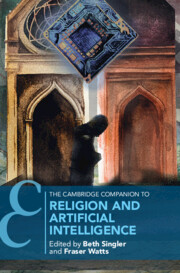Book contents
- The Cambridge Companion to Religion and Artificial Intelligence
- Cambridge Companions to Religion
- The Cambridge Companion to Religion and Artificial Intelligence
- Copyright page
- Contents
- Contributors
- Acknowledgements
- 1 Introduction
- 2 Steps towards Android Intelligence
- Part I Religions and AI
- Part II Social and Moral Issues
- 8 Transhumanism and Transcendence
- 9 The Eschatological Future of Artificial Intelligence
- 10 AI Ethics and Ethical AI
- 11 Black Theology × Artificial Intelligence
- 12 Imag(in)ing Human–Robot Relationships
- Part III Religious Studies
- Bibliography
- Index
- Cambridge Companions to Religion (continued from page ii)
- References
9 - The Eschatological Future of Artificial Intelligence
Saviour or Apocalypse?
from Part II - Social and Moral Issues
Published online by Cambridge University Press: 20 November 2024
- The Cambridge Companion to Religion and Artificial Intelligence
- Cambridge Companions to Religion
- The Cambridge Companion to Religion and Artificial Intelligence
- Copyright page
- Contents
- Contributors
- Acknowledgements
- 1 Introduction
- 2 Steps towards Android Intelligence
- Part I Religions and AI
- Part II Social and Moral Issues
- 8 Transhumanism and Transcendence
- 9 The Eschatological Future of Artificial Intelligence
- 10 AI Ethics and Ethical AI
- 11 Black Theology × Artificial Intelligence
- 12 Imag(in)ing Human–Robot Relationships
- Part III Religious Studies
- Bibliography
- Index
- Cambridge Companions to Religion (continued from page ii)
- References
Summary
While we call programs that are new and exciting ‘artificial intelligence’ (AI), the ultimate goal – to produce an artificial general intelligence that can equal to human intelligence – always seems to be in the future. AI can, thus, be viewed as a millenarian project. Groups predicting the second coming of Christ or some other form of salvation have flourished in times of societal stress, as they promise a solution to current problems that is delivered from outside. Today, we project both our hopes and our fears onto AI. Utopian visions range from the personally soteriological prospect of uploading our brains to a vision of a world in which AI has found solutions to our problems. Dystopian scenarios involve the creation of a superintelligent AI that slips from our control or is used as a weapon by malicious actors. Will AI save us or destroy us? Probably neither, but as we shape the trajectory of its future, we also shape our own.
- Type
- Chapter
- Information
- The Cambridge Companion to Religion and Artificial Intelligence , pp. 148 - 164Publisher: Cambridge University PressPrint publication year: 2024

